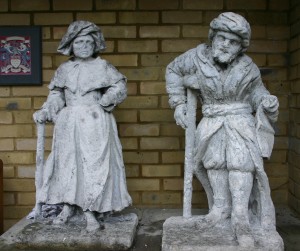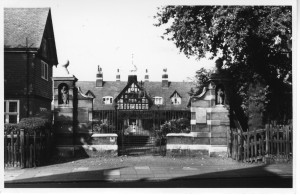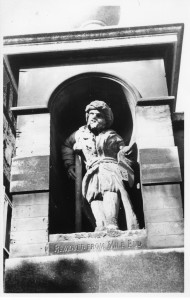
If you fancy a modest little outing this weekend, wait for a break in the weather and put on a hat and coat. Turn left from Green Lanes at the Fox and then cross the road, passing under the majestic holly arch and into Pellipar Close. Walk right to the end to the railings and look for the roof of an outbuilding in the well-kept gardens of Skinners Court.
Then, stand on tip toe. There, through the vegetation, you might just catch a glimpse of one of the oldest things in Palmers Green: two weather-beaten figures in stone, a man and a woman, the man with a crutch looking out imploringly, the woman also of straitened circumstances, perhaps barefoot. The figures didn’t start their life in Palmers Green – but they have spent their last one hundred years here.

Their original home was at the Skinners Almshouses which once stood 8 miles away in London’s East End. The first Skinners Almshouses, at St Helen’s Mile End were set up for the accommodation of six freemen of the Skinners Company, following a bequest in the will of Sir Andrew Judd in 1551. In 1683 the will of Lewis Newbery made further provision for twelve Skinners widows as long as they did not remarry.
Though often depicted as picturesque in contemporary pictures, the Mile End almshouses were modest, laid out as two rows of cottages, the doors of which gave onto a single room but with extensive gardens behind. The occupants were given a small pension, including an allowance for coal, and were expected to attend prayers twice a day.

And so it continued for two hundred years until the land was sold in 1895. New land had already been purchased in Palmers Green on the site of a farm owned by a Mr Graves, and new almshouses, designed in a simple yet graceful art and crafts style, took shape. The buildings were on three sides around a garden which faced onto Green Lanes, and in pride of position, set into pillars at the gate, were two figures which had adorned the Mile End site – the same figures you can still see in the gardens today. Alan Dumayne in his book Once upon a time in Palmers Green recalls that the old almshouses were a peaceful spot and the gardens a suntrap. Residents could often be seen sitting outside on deckchairs on a fine day.

Sadly the new building was only to last 70 years. It was destroyed by fire in 1966 and half the plot, that nearest Green Lanes, was developed into flats, separated from the new Skinners Court by Pellipar Close (Pellipar being a reminder of the old name of those who earned their living from the getting, fashioning and selling of furs). Incidentally, the site occupied by the flats was part of old Palmers Green’s original green.
The new Skinners Court is a modern, inviting building, with lovely gardens and a friendly demeanour. It still provides shelter for the retired, but not necessarily the destitute. But the two figures remain as a reminder of what destitution once meant.
- This article has been prepared as part of the process to nominate buildings and landmarks to Enfield’s updated local list. For more information see http://www.palmersgreenn13.com/2015/09/11/every-street-in-palmers-green/. If you have any suggestions for buildings which aren’t listed but should be included in the local list, I’m afraid it’s too late as today is the deadline, but I have, you know, been asking yer…
2 replies on “Every street in Palmers Green #10: Two elderly folk from Mile End”
For a moment, Sue, I thought you were referring to me and Jac!! (our last address was Mile end)
No, for then it would be two lovely people from Mile End …